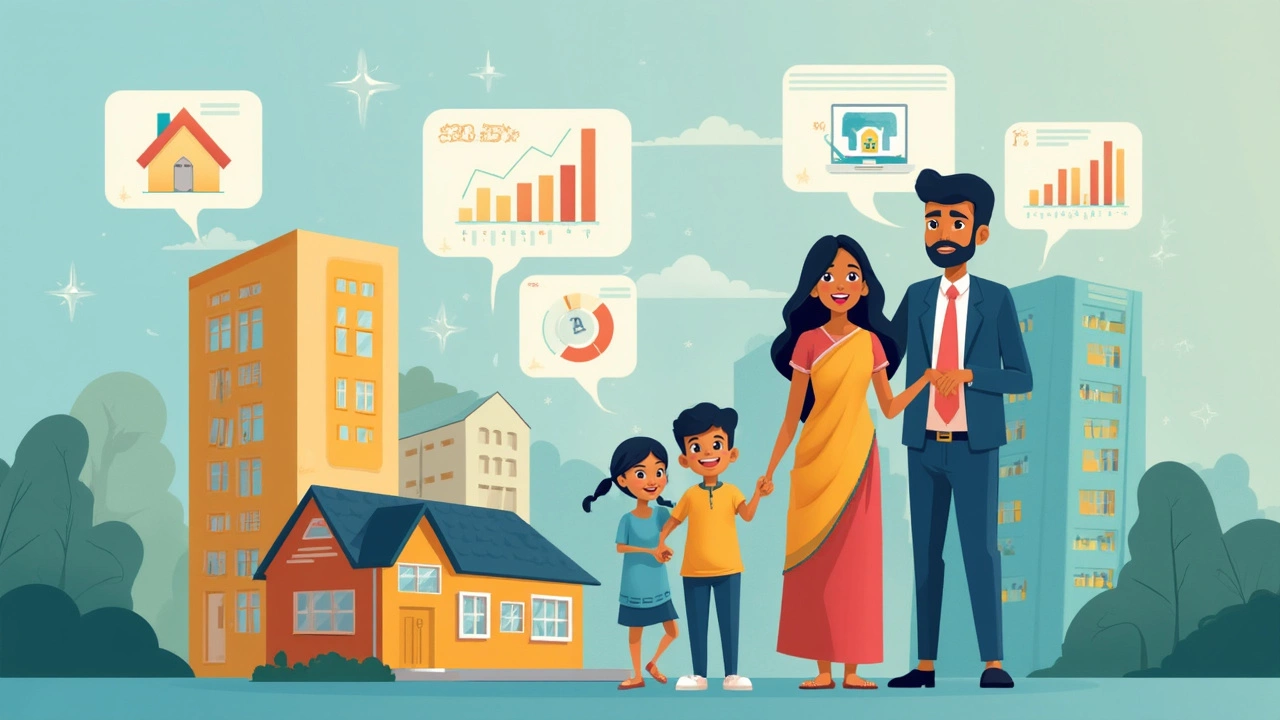Picture this: you scroll through online listings and see a house that looks perfect. But is it actually a good investment, or just another shiny money trap?
Everyone loves to talk about houses 'always going up in value,' but you can't rely on old advice from your parents' generation. Home prices jumped in the last few years, but so did mortgage rates and property taxes. Profit isn't just what you sell for—it's what you keep after all the surprise costs.
So how do you know if buying now will pay off later? Start by weighing what you spend versus what you could make. Don't just trust online calculators—dig into real numbers for your town, not national averages. It’s not all about the flashy listing price; closing costs, maintenance, HOA fees, and even repairs can eat into your bottom line. If you’re not careful, those little fees add up and bite big time.
- The Real Numbers: Home Value Growth
- Hidden Costs Nobody Mentions
- How Online Buying Changes the Game
- Renting vs. Owning in 2025
- What Makes a House Actually Profitable?
- Smart Steps Before You Click ‘Buy’
The Real Numbers: Home Value Growth
If you’re looking at house prices in 2025, things have definitely changed—even from just a year ago. U.S. home values rose about 5% between May 2024 and May 2025. Sure, that's not as wild as the double-digit jumps we saw during the pandemic, but it’s still positive. That means if you bought a $350,000 house last year, it’s probably worth around $367,500 now—on paper, at least.
But here’s the thing: growth isn’t the same everywhere. Some cities in Texas and Florida saw gains closer to 8%, while places with slower job growth, like parts of the Midwest, crept up just 2-3%. So, where you buy matters a lot. Don’t chase averages—look at recent sales in the neighborhood you want.
Also, don’t ignore inflation. If your home’s value goes up 5% but inflation hit 4%, your real profit is slimmer than it looks. Real estate websites like Redfin and Zillow can give you local year-over-year price changes, and that info is free. Always compare that growth to your expected costs over time.
- Check last year’s and this year’s sale prices for similar homes in the same area.
- Watch for trends—did prices dip last quarter or keep climbing?
- Match price growth to inflation, so you’re not tricked by ‘fake’ profits.
Bottom line: actual buying a house profit comes down to where and when you buy—and what those numbers look like after you factor in inflation and local trends. It’s not a sure thing, but if you do your homework, you’re already ahead of the crowd.
Hidden Costs Nobody Mentions
If you think the cost of a house is just the price you see online, brace yourself. There are a bunch of hidden costs that can turn your "affordable" dream home into a financial headache. Let’s break them down so you don’t get caught off guard.
First, there are property taxes. Depending on where you live, these can change every year. For example, Texas property taxes often hit 1.6% of a home’s value, while Hawaii averages closer to 0.3%. That difference isn’t pocket change.
Then, there’s home insurance. Lenders won’t let you close without it, and costs can spike if you’re in a flood or wildfire area. Sometimes, insurance can go up every year—with no warning.
Another one people overlook: closing costs. These usually land somewhere between 2% and 5% of the buy price. That’s for all kinds of stuff, like appraisal fees, title insurance, and lawyer fees. It adds up quickly.
| Hidden Cost | US Average (2024) |
|---|---|
| Property Taxes | $3,000/year |
| Home Insurance | $1,400/year |
| Closing Costs | $8,000 (one-time) |
| HOA Fees | $250/month |
| Maintenance | $3,500/year |
And don’t forget about regular upkeep. Stuff breaks—a new water heater, roof repairs, or even just lawn care add up over time. Experts say to budget at least 1% of your home’s value every year for maintenance.
If you buy a place in a community with an HOA (Homeowner’s Association), expect to pay monthly fees. These can be just $100 or up to $700 per month depending on where you live and what’s included. Maybe you get a pool; maybe you get a bill for someone else’s bad roof.
To sum it up, here’s what the National Association of Realtors says:
"Homeownership comes with a lot of responsibilities and routine expenses, far beyond what most buyers plan for on paper."
Here’s a quick checklist so you don’t get blindsided:
- Double-check property taxes for your area—not just the national average.
- Estimate closing costs before you make an offer.
- Ask for insurance quotes early, especially if the area has weather risks.
- Set aside at least 1% of the home price every year for repairs and maintenance.
- If buying in an HOA, read the rules and know the monthly fee up front.
The costs nobody talks about can be the difference between making money on your house and just scraping by. Knowing these up front makes all the difference.
How Online Buying Changes the Game
Doing everything online has made buying a house way more approachable—but it comes with its own set of rules and risks. No more awkward open houses or waiting weeks for an answer from a realtor. Today, you can scroll properties from your couch, set up virtual tours, and even sign paperwork, all from your phone or laptop.
Sites like Zillow, Redfin, and Realtor.com don't just list homes. They show price histories, tax records, and neighborhood data you used to need an agent for. Want to compare homes? Pull up dozens of listings side-by-side without stepping outside. See a house on Friday, place an offer by Sunday. It’s fast—sometimes too fast if you’re not careful.
Also, bidding wars get more intense online. Sellers know what similar homes in their area are pulling in, so they set aggressive prices from the start. Some listings even skip open markets and go to 'instant offers' where investors scoop them up in a flash. If you want to win, you need your finances and paperwork ready to go, so you don’t miss out while others press a button and lock it in.
Here’s something many online buyers miss: the lack of face-to-face contact can make it easy to overlook problems. Photos and 3D tours look slick, but they might hide an ancient furnace or a leaky roof. Don’t ever skip an independent inspection, even when the listing looks perfect.
Bottom line—shopping online puts the market at your fingertips, but it also means you’ve got to do your homework. Learn how to read property reports, understand the timeline for digital offers, and always double-check each step before sending any money.

Renting vs. Owning in 2025
The age-old debate is in overdrive this year: rent, or take the plunge into home ownership? Both sides have big pros and brutal cons, and what made sense in 2020 doesn’t always work now.
Check these quick facts for context:
| 2025 National Average | Monthly Rent | Monthly Mortgage Payment |
|---|---|---|
| United States | $2,050 | $2,300 |
| California | $3,200 | $3,550 |
| Texas | $1,750 | $2,000 |
This year, rents climbed just 3% over 2024, while average monthly mortgage payments went up nearly 7%—thanks to higher interest rates and home insurance spikes. In many cities, it’s now cheaper month-to-month to rent, especially if you factor in the extra costs owners pay, like repairs and taxes.
- As a renter, you can move with 30 days’ notice and avoid big fixes when the fridge dies or the roof leaks.
- If you own, you get stability—you lock in that payment, build equity, and aren’t at the mercy of landlords bumping up the rent every renewal.
But beware: buying doesn’t mean instant profit. The gap between renting and owning has narrowed. Zillow reports that in 2025, it usually takes about 7 years for home ownership to beat out renting, once you add up closing costs, agent fees, and typical home repairs.
Want to cash in on buying a house? You need a long game—think 5+ years, not quick flips. If you may have to relocate soon, renting probably wins. If you’re in it for the long haul and ready for the hidden costs, ownership could still pay off, especially if rents keep rising in your area.
What Makes a House Actually Profitable?
It’s not just about snagging a good-looking place or hoping the market keeps climbing. A house only turns into a real moneymaker if you buy smart and keep an eye on the numbers that matter. Here’s what actually drives profit in property:
- Location: It still reigns. A place close to good schools, jobs, public transport, and parks usually holds value. Suburban homes within an hour from big city centers saw 11% annual gains in 2024, way more than homes further out.
- Initial Price: If you overpay, it can take years to break even. Aim for homes slightly under local market value and check recent sales on the same street, not just broad city stats.
- Ongoing Costs: Taxes, insurance, repairs, and HOA fees are the profit killers. Research shows average annual maintenance runs 1-3% of the purchase price. If you’re not budgeting for these, profits melt away fast.
- Rental Potential: Good rental income can actually make a house profitable even if the market stalls. Properties in college towns or city centers rented at least 98% occupancy in 2024 according to Apartment List.
- Market Timing: Buying when rates are lower or inventory is high gives you negotiating power. In 2025, buyers with pre-approved mortgages often scored 2-3% below list price due to less competition.
Check out the breakdown for an average home purchase below:
| Cost/Factor | 2024-2025 Average |
|---|---|
| Median Home Price (US) | $412,000 |
| Average Mortgage Rate | 6.7% |
| Typical Closing Costs | $8,500 |
| Annual Maintenance (1.5%) | $6,180 |
| Average Annual Property Taxes | $4,200 |
| Average Annual Home Insurance | $1,500 |
| Average Rent for Similar Home | $2,000/month |
How do you actually profit? You need the home’s value to appreciate faster than your combined costs and you could also rent it for decent income if you ever move out. Chasing deals with the best buying a house potential instead of just what looks trendy makes all the difference.
Smart Steps Before You Click ‘Buy’
Online listings make it easy to get excited and rush into things, but buying a house isn’t like adding sneakers to your cart. Be smart before you make the biggest purchase of your life.
First, get your budget straight—down to the last dollar. Don’t just think about how much you’re approved for; focus on what you can comfortably pay each month, including utilities and surprise repairs. Ignoring the true monthly cost sidelines plenty of first-time buyers.
- Pull your credit report before any lender does. Better credit usually means a lower interest rate. Even a 1% drop can save you thousands over the life of a loan.
- Use at least three online mortgage calculators from real banks, not just real estate sites. They’ll be honest about fees like private mortgage insurance or property taxes.
- Scout recent sales in your exact neighborhood. Check sites like Redfin or Zillow for homes sold in the last six months—don’t use national stats, as they’re too broad to be useful.
- Set alerts for price drops and new listings that match your needs. Move quickly if you see a deal, but don’t skip an in-person tour. Virtual tours leave out stuff like neighborhood vibes or odd smells.
Take a close look at the real numbers in your area:
| Expense | Average Cost (2025, US) |
|---|---|
| Closing Costs | $7,500 |
| Annual Property Tax | 1.1% of the home’s value |
| Average Home Repair | $4,000/year |
| Mortgage Rate (30-year fixed) | 6.5% |
If your numbers don’t work out with these real-world costs, keep renting and saving. Chasing a deal can end up costing more than waiting a year for the right moment.
Before you make an offer, get a home inspection—even if you’re buying online. You never want to discover major repairs after you move in. If there’s an HOA, look at rules and fees. They can drain your wallet if you’re not careful.
Remember, the key to buying a house profitably is doing your homework—not just falling for a checkout button. Take your time, question every cost, and don’t let anyone rush you through the process.





